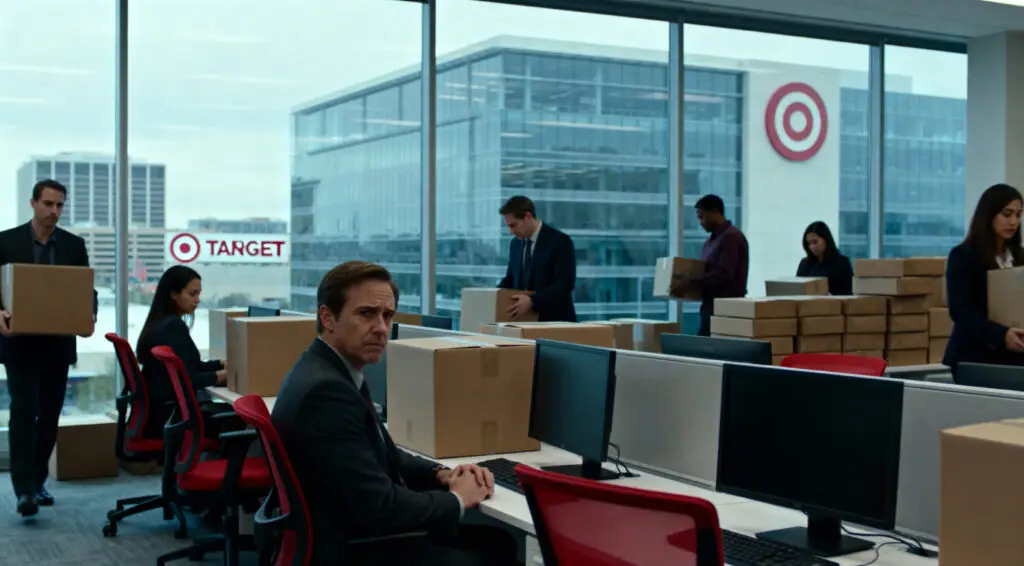Target Announces Its First Major Layoffs in a Decade
Target Corporation plans to lay off 1,800 corporate workers next week as part of a major strategy to turn the firm around after 4 years of flat sales. This is the first time in more than 10 years that the store has had to lay off a lot of people, and it shows how much pressure they are under to compete with Walmart and other big competitors.
The layoffs will touch around 8% of Target’s worldwide corporate personnel, which shows that the company is making big changes. On Thursday, employees were told about the proposal, and further information is anticipated to come out early next week.

CEO Michael Fiddelke Leads Strategic Overhaul
Michael Fiddelke, the new CEO and a 20-year veteran of the firm, called the layoffs “a necessary step in building the future of Target.” Fiddelke will formally take over as CEO in February 2026, taking over for Brian Cornell, who is currently in charge.
Fiddelke said in a business message, “Too many layers and overlapping work have slowed decisions, making it harder to bring ideas to life.” He also said that making things easier will let Target “move faster and focus on what matters most to our guests.”
Office Roles Impacted, Store Jobs Remain Safe
A representative for Target said that roughly 1,000 corporate workers will lose their jobs, while 800 other jobs will stay open. The changes will mostly affect corporate headquarters, not the workers at Target’s almost 2,000 shops in the U.S.
As the reorganization process goes on, Fiddelke told corporate employees to work from home next week. On Tuesday, the corporation is anticipated to give further information about which departments and functions may be affected.
Recommended Article: Nike Unites Global Teams to Boost Next-Gen Athlete Performance
Lagging Behind Rivals Amid Declining Sales
The layoffs are part of a bigger plan to get things back on track after a few quarters of lackluster performance. This year, Target’s stock price has dropped 30%, while Walmart and other competitors have experienced gains of around 18%. Analysts say that the drop is due to problems in the economy as a whole and mistakes made by the corporation itself.
People are spending less on things they don’t need, including clothes and gadgets. These types of products make up about half of Target’s sales. Inflation, uncertainties over tariffs, and changes in how people shop have all made the company’s financial problems worse.
Diversity Backlash and Inventory Missteps
In addition to market difficulties, Target has also experienced criticism for its diversity, equity, and inclusion (DEI) policies, which some consumers thought were politically contentious. The corporation subsequently cut down on some of its plans, but the issue hurt how people saw the brand and slowed down sales.
Target has also had trouble managing its inventory, which has led to some shops being overstocked and others not doing as well as they should. These operational problems have made profits even lower and made officials reassess the company’s long-term plan.
New Focus on Efficiency and Product Quality
Fiddelke has promised to bring Target’s operations up to date, make the products better, and use more technology-based solutions in the store. In his announcement on his hiring in August, he emphasized that Target needed to “move faster, much faster” to be relevant in a retail world that is always changing.
The business wants to use technology to make supply chains more efficient, improve the online buying experience, and make inventories more accurate. Target wants to be more flexible and responsive to consumer requirements by cutting down on unnecessary levels of management.
Target Enters Decade’s Biggest Shakeup Focused on Affordability and Growth
Target’s layoffs are seen as a warning sign and a potential trigger for long-term recovery. Analysts believe Fiddelke’s recovery strategy will only work if he can win back customers’ confidence and improve Target’s value offer in a competitive market.
Target emphasizes affordability and easy purchase of clothes, groceries, and home goods, but for growth, people need to buy more non-essential items. Fiddelke’s leadership marks the beginning of a crucial time for Target, as it undergoes its biggest corporate shakeup in 10 years.























